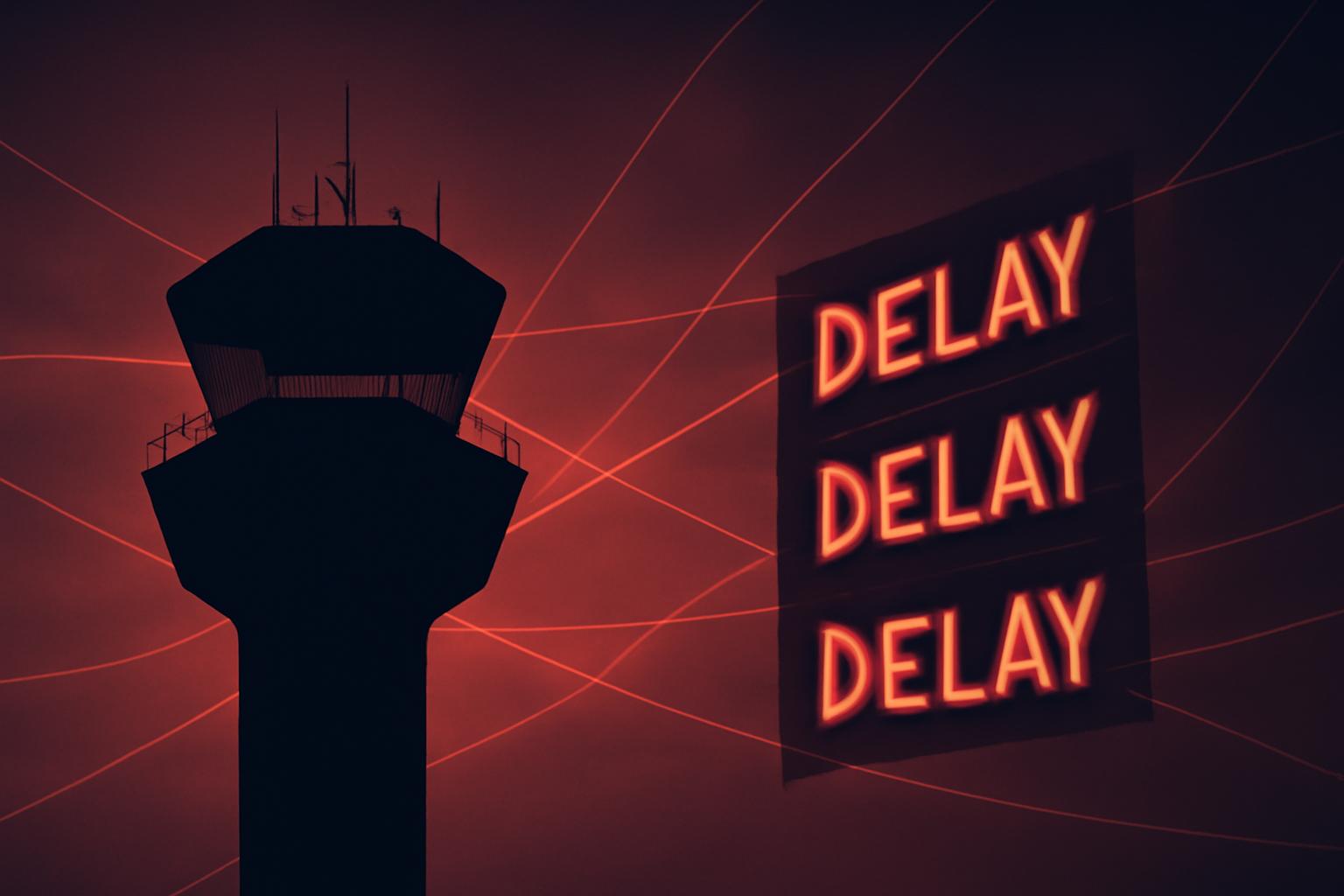The FAA’s warning highlights systemic vulnerabilities in the U.S. aviation sector exacerbated by political impasses. The staffing shortages among air traffic controllers represent a critical operational risk, especially during periods of government shutdown when key personnel work unpaid and under stress. !-- wp:paragraph -->
- Opportunities: Prompt government funding can stabilize air traffic control operations, restoring confidence in U.S. air travel reliability.
- Risks: Prolonged shutdowns may intensify staffing shortages, increasing flight delays and safety concerns.
- Operational Impact: Airports with historically thin staffing are most vulnerable to delays and capacity constraints.
- Labor Relations: Continued unpaid work risks morale and potential labor disputes among controllers.
FinOracleAI — Market View
The FAA’s warning highlights systemic vulnerabilities in the U.S. aviation sector exacerbated by political impasses. The staffing shortages among air traffic controllers represent a critical operational risk, especially during periods of government shutdown when key personnel work unpaid and under stress. !-- wp:paragraph -->- Opportunities: Prompt government funding can stabilize air traffic control operations, restoring confidence in U.S. air travel reliability.
- Risks: Prolonged shutdowns may intensify staffing shortages, increasing flight delays and safety concerns.
- Operational Impact: Airports with historically thin staffing are most vulnerable to delays and capacity constraints.
- Labor Relations: Continued unpaid work risks morale and potential labor disputes among controllers.
FinOracleAI — Market View
The FAA’s warning highlights systemic vulnerabilities in the U.S. aviation sector exacerbated by political impasses. The staffing shortages among air traffic controllers represent a critical operational risk, especially during periods of government shutdown when key personnel work unpaid and under stress. !-- wp:paragraph -->- Opportunities: Prompt government funding can stabilize air traffic control operations, restoring confidence in U.S. air travel reliability.
- Risks: Prolonged shutdowns may intensify staffing shortages, increasing flight delays and safety concerns.
- Operational Impact: Airports with historically thin staffing are most vulnerable to delays and capacity constraints.
- Labor Relations: Continued unpaid work risks morale and potential labor disputes among controllers.
Impact of Government Shutdown on Aviation Workforce
The government shutdown, which extended into its eighth day as of Wednesday, has left essential workers such as air traffic controllers and TSA agents working without pay. Meanwhile, many other federal employees remain furloughed. !-- wp:paragraph --> This is not the first time a shutdown has affected air travel. A prolonged shutdown in late 2018 similarly caused severe travel disruptions due to controller shortages, leading to a swift resolution once air traffic snarls became widespread. !-- wp:paragraph -->FinOracleAI — Market View
The FAA’s warning highlights systemic vulnerabilities in the U.S. aviation sector exacerbated by political impasses. The staffing shortages among air traffic controllers represent a critical operational risk, especially during periods of government shutdown when key personnel work unpaid and under stress. !-- wp:paragraph -->- Opportunities: Prompt government funding can stabilize air traffic control operations, restoring confidence in U.S. air travel reliability.
- Risks: Prolonged shutdowns may intensify staffing shortages, increasing flight delays and safety concerns.
- Operational Impact: Airports with historically thin staffing are most vulnerable to delays and capacity constraints.
- Labor Relations: Continued unpaid work risks morale and potential labor disputes among controllers.
Impact of Government Shutdown on Aviation Workforce
The government shutdown, which extended into its eighth day as of Wednesday, has left essential workers such as air traffic controllers and TSA agents working without pay. Meanwhile, many other federal employees remain furloughed. !-- wp:paragraph --> This is not the first time a shutdown has affected air travel. A prolonged shutdown in late 2018 similarly caused severe travel disruptions due to controller shortages, leading to a swift resolution once air traffic snarls became widespread. !-- wp:paragraph -->FinOracleAI — Market View
The FAA’s warning highlights systemic vulnerabilities in the U.S. aviation sector exacerbated by political impasses. The staffing shortages among air traffic controllers represent a critical operational risk, especially during periods of government shutdown when key personnel work unpaid and under stress. !-- wp:paragraph -->- Opportunities: Prompt government funding can stabilize air traffic control operations, restoring confidence in U.S. air travel reliability.
- Risks: Prolonged shutdowns may intensify staffing shortages, increasing flight delays and safety concerns.
- Operational Impact: Airports with historically thin staffing are most vulnerable to delays and capacity constraints.
- Labor Relations: Continued unpaid work risks morale and potential labor disputes among controllers.
“Nearly 11,000 fully certified controllers remain on the job, many working 10-hour shifts as many as six days a week, showing extraordinary dedication to safely guiding millions of passengers to their destinations—all without getting paid during this shutdown,” said the National Air Traffic Controllers Association (NATCA) in a statement.
Duffy urged Congress to pass a funding bill promptly to alleviate pressure on essential personnel and avoid further disruption in air travel. !-- wp:paragraph --> He emphasized that no single airport is consistently experiencing staffing problems, but the overall shortage raises concerns for aviation safety and efficiency. !-- wp:paragraph -->Impact of Government Shutdown on Aviation Workforce
The government shutdown, which extended into its eighth day as of Wednesday, has left essential workers such as air traffic controllers and TSA agents working without pay. Meanwhile, many other federal employees remain furloughed. !-- wp:paragraph --> This is not the first time a shutdown has affected air travel. A prolonged shutdown in late 2018 similarly caused severe travel disruptions due to controller shortages, leading to a swift resolution once air traffic snarls became widespread. !-- wp:paragraph -->FinOracleAI — Market View
The FAA’s warning highlights systemic vulnerabilities in the U.S. aviation sector exacerbated by political impasses. The staffing shortages among air traffic controllers represent a critical operational risk, especially during periods of government shutdown when key personnel work unpaid and under stress. !-- wp:paragraph -->- Opportunities: Prompt government funding can stabilize air traffic control operations, restoring confidence in U.S. air travel reliability.
- Risks: Prolonged shutdowns may intensify staffing shortages, increasing flight delays and safety concerns.
- Operational Impact: Airports with historically thin staffing are most vulnerable to delays and capacity constraints.
- Labor Relations: Continued unpaid work risks morale and potential labor disputes among controllers.
Transportation Secretary and Union Speak on Controller Shortages
Transportation Secretary Sean Duffy acknowledged a “slight uptick” in sick calls among air traffic controllers on Monday, attributing part of the staffing strain to the ongoing government shutdown. !-- wp:paragraph -->“Nearly 11,000 fully certified controllers remain on the job, many working 10-hour shifts as many as six days a week, showing extraordinary dedication to safely guiding millions of passengers to their destinations—all without getting paid during this shutdown,” said the National Air Traffic Controllers Association (NATCA) in a statement.
Duffy urged Congress to pass a funding bill promptly to alleviate pressure on essential personnel and avoid further disruption in air travel. !-- wp:paragraph --> He emphasized that no single airport is consistently experiencing staffing problems, but the overall shortage raises concerns for aviation safety and efficiency. !-- wp:paragraph -->Impact of Government Shutdown on Aviation Workforce
The government shutdown, which extended into its eighth day as of Wednesday, has left essential workers such as air traffic controllers and TSA agents working without pay. Meanwhile, many other federal employees remain furloughed. !-- wp:paragraph --> This is not the first time a shutdown has affected air travel. A prolonged shutdown in late 2018 similarly caused severe travel disruptions due to controller shortages, leading to a swift resolution once air traffic snarls became widespread. !-- wp:paragraph -->FinOracleAI — Market View
The FAA’s warning highlights systemic vulnerabilities in the U.S. aviation sector exacerbated by political impasses. The staffing shortages among air traffic controllers represent a critical operational risk, especially during periods of government shutdown when key personnel work unpaid and under stress. !-- wp:paragraph -->- Opportunities: Prompt government funding can stabilize air traffic control operations, restoring confidence in U.S. air travel reliability.
- Risks: Prolonged shutdowns may intensify staffing shortages, increasing flight delays and safety concerns.
- Operational Impact: Airports with historically thin staffing are most vulnerable to delays and capacity constraints.
- Labor Relations: Continued unpaid work risks morale and potential labor disputes among controllers.
Transportation Secretary and Union Speak on Controller Shortages
Transportation Secretary Sean Duffy acknowledged a “slight uptick” in sick calls among air traffic controllers on Monday, attributing part of the staffing strain to the ongoing government shutdown. !-- wp:paragraph -->“Nearly 11,000 fully certified controllers remain on the job, many working 10-hour shifts as many as six days a week, showing extraordinary dedication to safely guiding millions of passengers to their destinations—all without getting paid during this shutdown,” said the National Air Traffic Controllers Association (NATCA) in a statement.
Duffy urged Congress to pass a funding bill promptly to alleviate pressure on essential personnel and avoid further disruption in air travel. !-- wp:paragraph --> He emphasized that no single airport is consistently experiencing staffing problems, but the overall shortage raises concerns for aviation safety and efficiency. !-- wp:paragraph -->Impact of Government Shutdown on Aviation Workforce
The government shutdown, which extended into its eighth day as of Wednesday, has left essential workers such as air traffic controllers and TSA agents working without pay. Meanwhile, many other federal employees remain furloughed. !-- wp:paragraph --> This is not the first time a shutdown has affected air travel. A prolonged shutdown in late 2018 similarly caused severe travel disruptions due to controller shortages, leading to a swift resolution once air traffic snarls became widespread. !-- wp:paragraph -->FinOracleAI — Market View
The FAA’s warning highlights systemic vulnerabilities in the U.S. aviation sector exacerbated by political impasses. The staffing shortages among air traffic controllers represent a critical operational risk, especially during periods of government shutdown when key personnel work unpaid and under stress. !-- wp:paragraph -->- Opportunities: Prompt government funding can stabilize air traffic control operations, restoring confidence in U.S. air travel reliability.
- Risks: Prolonged shutdowns may intensify staffing shortages, increasing flight delays and safety concerns.
- Operational Impact: Airports with historically thin staffing are most vulnerable to delays and capacity constraints.
- Labor Relations: Continued unpaid work risks morale and potential labor disputes among controllers.
Flight Delay Trends Amid Staffing Shortfalls
Earlier in the week, approximately 10,000 flights faced delays on Monday and Tuesday. By Wednesday, disruptions had decreased significantly to just over 3,200 delayed flights nationwide. It is important to note that delays may also stem from weather and other operational issues beyond staffing shortages. !-- wp:paragraph --> The FAA had previously cautioned about potential staffing-related delays at Newark Liberty International Airport; however, those concerns were alleviated by midday Wednesday, with no significant delays reported at Newark. !-- wp:paragraph -->Transportation Secretary and Union Speak on Controller Shortages
Transportation Secretary Sean Duffy acknowledged a “slight uptick” in sick calls among air traffic controllers on Monday, attributing part of the staffing strain to the ongoing government shutdown. !-- wp:paragraph -->“Nearly 11,000 fully certified controllers remain on the job, many working 10-hour shifts as many as six days a week, showing extraordinary dedication to safely guiding millions of passengers to their destinations—all without getting paid during this shutdown,” said the National Air Traffic Controllers Association (NATCA) in a statement.
Duffy urged Congress to pass a funding bill promptly to alleviate pressure on essential personnel and avoid further disruption in air travel. !-- wp:paragraph --> He emphasized that no single airport is consistently experiencing staffing problems, but the overall shortage raises concerns for aviation safety and efficiency. !-- wp:paragraph -->Impact of Government Shutdown on Aviation Workforce
The government shutdown, which extended into its eighth day as of Wednesday, has left essential workers such as air traffic controllers and TSA agents working without pay. Meanwhile, many other federal employees remain furloughed. !-- wp:paragraph --> This is not the first time a shutdown has affected air travel. A prolonged shutdown in late 2018 similarly caused severe travel disruptions due to controller shortages, leading to a swift resolution once air traffic snarls became widespread. !-- wp:paragraph -->FinOracleAI — Market View
The FAA’s warning highlights systemic vulnerabilities in the U.S. aviation sector exacerbated by political impasses. The staffing shortages among air traffic controllers represent a critical operational risk, especially during periods of government shutdown when key personnel work unpaid and under stress. !-- wp:paragraph -->- Opportunities: Prompt government funding can stabilize air traffic control operations, restoring confidence in U.S. air travel reliability.
- Risks: Prolonged shutdowns may intensify staffing shortages, increasing flight delays and safety concerns.
- Operational Impact: Airports with historically thin staffing are most vulnerable to delays and capacity constraints.
- Labor Relations: Continued unpaid work risks morale and potential labor disputes among controllers.
Flight Delay Trends Amid Staffing Shortfalls
Earlier in the week, approximately 10,000 flights faced delays on Monday and Tuesday. By Wednesday, disruptions had decreased significantly to just over 3,200 delayed flights nationwide. It is important to note that delays may also stem from weather and other operational issues beyond staffing shortages. !-- wp:paragraph --> The FAA had previously cautioned about potential staffing-related delays at Newark Liberty International Airport; however, those concerns were alleviated by midday Wednesday, with no significant delays reported at Newark. !-- wp:paragraph -->Transportation Secretary and Union Speak on Controller Shortages
Transportation Secretary Sean Duffy acknowledged a “slight uptick” in sick calls among air traffic controllers on Monday, attributing part of the staffing strain to the ongoing government shutdown. !-- wp:paragraph -->“Nearly 11,000 fully certified controllers remain on the job, many working 10-hour shifts as many as six days a week, showing extraordinary dedication to safely guiding millions of passengers to their destinations—all without getting paid during this shutdown,” said the National Air Traffic Controllers Association (NATCA) in a statement.
Duffy urged Congress to pass a funding bill promptly to alleviate pressure on essential personnel and avoid further disruption in air travel. !-- wp:paragraph --> He emphasized that no single airport is consistently experiencing staffing problems, but the overall shortage raises concerns for aviation safety and efficiency. !-- wp:paragraph -->Impact of Government Shutdown on Aviation Workforce
The government shutdown, which extended into its eighth day as of Wednesday, has left essential workers such as air traffic controllers and TSA agents working without pay. Meanwhile, many other federal employees remain furloughed. !-- wp:paragraph --> This is not the first time a shutdown has affected air travel. A prolonged shutdown in late 2018 similarly caused severe travel disruptions due to controller shortages, leading to a swift resolution once air traffic snarls became widespread. !-- wp:paragraph -->FinOracleAI — Market View
The FAA’s warning highlights systemic vulnerabilities in the U.S. aviation sector exacerbated by political impasses. The staffing shortages among air traffic controllers represent a critical operational risk, especially during periods of government shutdown when key personnel work unpaid and under stress. !-- wp:paragraph -->- Opportunities: Prompt government funding can stabilize air traffic control operations, restoring confidence in U.S. air travel reliability.
- Risks: Prolonged shutdowns may intensify staffing shortages, increasing flight delays and safety concerns.
- Operational Impact: Airports with historically thin staffing are most vulnerable to delays and capacity constraints.
- Labor Relations: Continued unpaid work risks morale and potential labor disputes among controllers.
FAA Highlights Air Traffic Controller Shortages Impacting U.S. Flight Operations
The Federal Aviation Administration (FAA) issued a warning on Wednesday regarding flight delays caused by a shortage of air traffic controllers amid the ongoing U.S. government shutdown. The staffing deficit has forced operational slowdowns at several airports, compounding delays already influenced by weather and other factors. !-- wp:paragraph --> Notably, Ronald Reagan Washington National Airport experienced half-hour delays late Wednesday afternoon directly linked to controller staffing challenges. The FAA also reported that the shortage prompted restrictions on arrivals at Hollywood Burbank Airport in California and Nashville International Airport in Tennessee. !-- wp:paragraph -->Flight Delay Trends Amid Staffing Shortfalls
Earlier in the week, approximately 10,000 flights faced delays on Monday and Tuesday. By Wednesday, disruptions had decreased significantly to just over 3,200 delayed flights nationwide. It is important to note that delays may also stem from weather and other operational issues beyond staffing shortages. !-- wp:paragraph --> The FAA had previously cautioned about potential staffing-related delays at Newark Liberty International Airport; however, those concerns were alleviated by midday Wednesday, with no significant delays reported at Newark. !-- wp:paragraph -->Transportation Secretary and Union Speak on Controller Shortages
Transportation Secretary Sean Duffy acknowledged a “slight uptick” in sick calls among air traffic controllers on Monday, attributing part of the staffing strain to the ongoing government shutdown. !-- wp:paragraph -->“Nearly 11,000 fully certified controllers remain on the job, many working 10-hour shifts as many as six days a week, showing extraordinary dedication to safely guiding millions of passengers to their destinations—all without getting paid during this shutdown,” said the National Air Traffic Controllers Association (NATCA) in a statement.
Duffy urged Congress to pass a funding bill promptly to alleviate pressure on essential personnel and avoid further disruption in air travel. !-- wp:paragraph --> He emphasized that no single airport is consistently experiencing staffing problems, but the overall shortage raises concerns for aviation safety and efficiency. !-- wp:paragraph -->Impact of Government Shutdown on Aviation Workforce
The government shutdown, which extended into its eighth day as of Wednesday, has left essential workers such as air traffic controllers and TSA agents working without pay. Meanwhile, many other federal employees remain furloughed. !-- wp:paragraph --> This is not the first time a shutdown has affected air travel. A prolonged shutdown in late 2018 similarly caused severe travel disruptions due to controller shortages, leading to a swift resolution once air traffic snarls became widespread. !-- wp:paragraph -->FinOracleAI — Market View
The FAA’s warning highlights systemic vulnerabilities in the U.S. aviation sector exacerbated by political impasses. The staffing shortages among air traffic controllers represent a critical operational risk, especially during periods of government shutdown when key personnel work unpaid and under stress. !-- wp:paragraph -->- Opportunities: Prompt government funding can stabilize air traffic control operations, restoring confidence in U.S. air travel reliability.
- Risks: Prolonged shutdowns may intensify staffing shortages, increasing flight delays and safety concerns.
- Operational Impact: Airports with historically thin staffing are most vulnerable to delays and capacity constraints.
- Labor Relations: Continued unpaid work risks morale and potential labor disputes among controllers.













